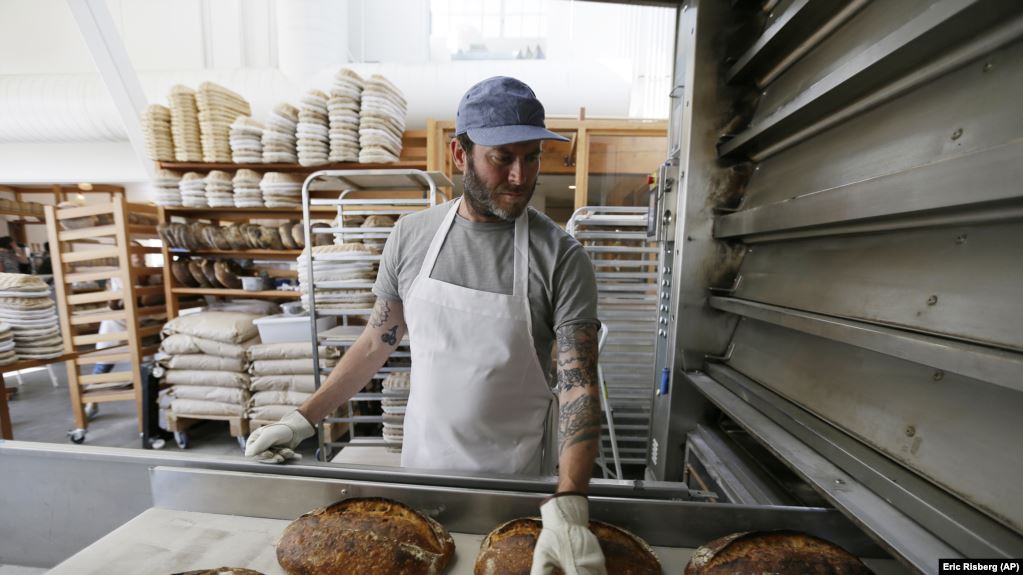پادکست VOA: اصطلاحات انگلیسی – نون و کره
سلام با شصت وششمین قسمت از مجموعه “Words and Their Stories” (کلمات و داستان آن ها) از سری پادکستهای VOA در خدمت شما هستیم. این مجموعه پادکست به توضیح اصطلاحات رایج زبان انگلیسی، داستان ایجاد شدنشون و نحوه استفاده از آن ها در مکالمه می پردازه. در این قسمت از پادکست VOA: اصطلاحات انگلیسی – نون و کره با معنی، کاربرد و تاریخچه عبارت “bread and butter” و چند اصطلاح مرتبط با bread آشنا بشی. در کنارش چندین اصطلاح و کلمه ی جالب و کاربردی دیگه هم یاد میگیری که لیست این کلمه ها به همراه معنی اون ها در پایان مطلب قرار گرفته.
عبارت “bread and butter” (نون و کره) به منبع درآمد یا یه چیز عادی روزمره اشاره داره. اصطلاح “know which side your bread is buttered on” (بدون کدوم سمت نونت کره ایه) یعنی بدون از کدوم آدمها می تونی کمک بگیری. “best thing since sliced bread” (بهترین چیز از زمان نون برش داده شده) یعنی چیزی که خیلی خوب و باحاله.
VOA – Words and Their Stories – 66 :What Is Your ‘Bread and Butter’?

متن انگلیسی پادکست VOA: اصطلاحات انگلیسی – نون و کره :
Now the VOA Learning English program Words and Their Stories.
Today we talk about a food expression using something most cultures have – bread. It could be naan bread of India, a pita from the Middle East or steamed bread from China. The French have the baguette and Italians have ciabatta. Scandinavian countries often eat heavy, dark breads. And people throughout South America may eat deep fried breads.
Some people like to dip their bread into olive oil. Some like to spread chocolate on top. But one of the best things to put on bread — especially if it is warm from the oven — is butter!
Bread and butter is a classic combination.
But “bread and butter” also means something almost as comforting: a way to make money!
Some word experts say the phrase “bread and butter” began in Europe and England during the Middle Ages. At that time, many peasants could only afford bread and butter as their entire meal. Or they would eat it with soup.
So, bread and butter was a food staple. And that is what the expression “bread and butter” meant for many years – a basic item for life. After you got your bread and butter, you could then purchase more items for your household.
Then around the 1600s, the meaning changed. People began using it to mean the way they earned a living, or their livelihood.
So, that is the origin. Here is how you can use it.
Let’s say you really like to write and perform songs. But you do not make enough money doing those things to pay for your housing, groceries and other expenses. So you get a job as a website designer. If someone asks what you do, you could say, “Well, I’m a musician. But designing websites is my bread-and-butter.”
In other words, designing websites pays your bills. Making music … does not. So, you count on web design for your “bread and butter.”
For some people, it is important to have a stable bread-and-butter job. They get nervous if they do not have a steady paycheck coming in. Being a doctor is a good bread-and-butter job. If you are an import-export specialist, you could say business and trade are your bread and butter.
Now, if you really like your job and it pays well, you probably want to keep it. And if you work for someone else, you probably want to keep them happy. In other words, you should know which side your bread is buttered on.
“To know which side your bread is buttered on” means you are aware of the people who can help you. But this expression has a bad feel to it. It means being unusually aware of how others can help you.
Now, let’s hear two friends use some of these expressions in a short conversation.
A: Hey, do you want to go to the football game this afternoon?
B: I can’t. I have to help my girlfriend’s dad paint his garage. He may be able to help me get a job at his software company.
A: I see. Well, it’s always good to know which side your bread is buttered on.
B: Do you have to make it sound that way?
A: Which way is that?
B: Like I’m scheming or plotting or something like that.
A: I’m just saying you’re being smart. If he can help you, it’s a good idea to help him.
B: Look. Designing software is my bread-and-butter. And don’t forget – I’m the breadwinner for my mom and two brothers. So, I’m lucky to know someone who is so connected in the business.
A: Well, just make sure you stay on his daughter’s good side too. If you guys break up, you might find yourself on the breadline.
B: Urgh. Let’s change the subject!
And that’s all the time we have for Words and Their Stories. I hope you have enjoyed learning about these bread expressions. The story editor, Kelly Jean Kelly, liked it. She said it was the best thing since sliced bread! When bakers started slicing bread it made it easier to eat. So, when something is very good we can say it is the best thing since sliced bread. This was a very nice thing for Kelly to say even if it was a great exaggeration!
لیست واژگان این پادکست
classic (کلاسیک) – adj. used to say that something has come to be considered one of the best of its kind; used to say that something is an example of excellence
staple (جز اصلی هرچیزی) – n. something that is used widely and often : I went shopping for bread, milk, and other staples.
livelihood (امرار معاش) – n. a way of earning money in order to live
scheme (نقشه کشیدن) – v. to make plans to do or get something in a secret and often dishonest way
plot (طرح و نقشه) – v. to plan secretly to do something usually illegal or harmful
lucky (خوش شانس) – adj. producing or resulting in good by chance
breadwinner (نان آور) – n. a person who earns money to support a family
breadline (صفی که مردم منتظرند غذای رایگان دریافت کنند: صلواتی) – n. a line of people waiting to receive free food
exaggeration (مبالغه) – n. the act of describing as larger or greater than what is true : a statement that has been enlarged beyond what is true
امیدوارم از پادکست VOA: اصطلاحات انگلیسی – نون و کره لذت برده باشید. برای دسترسی به قسمت های دیگر این پادکست می توانید از صفحه ی پادکست VOA: اصطلاحات انگلیسی آکادمی مجازی آموزش زبان ۲۴talk دیدن کنید.
همچنین برای گوش دادن به پادکست های سطح بندی شده British Council می توانید به صفحه ی پادکست British Council آکادمی مجازی آموزش زبان ۲۴talk یا برای گوش دادن به پادکست های BBC به صفحه ی پادکست ۶ دقیقه انگلیسی (BBC) آکادمی مجازی آموزش زبان ۲۴talk مراجعه کنید.
گوش دادن به پادکست روش خوبی برای تقویت مهارت شنیداری و هم چنین یادگرفتن کلمات در بستر یک موضوع خاصه که این به تقویت مهارت مکالمه انگلیسی نیز کمک زیادی می کنه.
اگه دنبال این هستی که مهارت های مکالمه زبان انگلیسیت رو بیشتر از این تقویت کنی بهت پیشنهاد میکنم در دورهی مکالمه زبان انگلیسی آکادمی مجازی آموزش زبان انگلیسی ۲۴talk شرکت کنی که با یه برنامه منسجم و خلاقانه کمک میکنه در زمان کوتاه بتونی به راحتی و روانی انگلیسی صحبت کنی.







